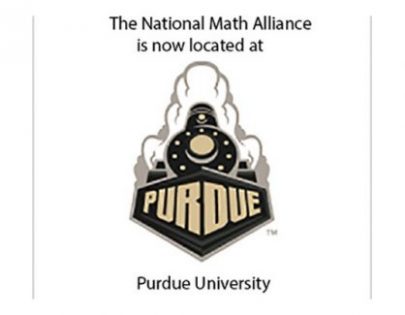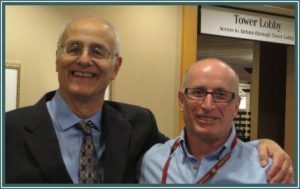The Math Alliance Moves to Purdue University, Department of Mathematics

With the New Year comes a new home for the National Alliance for Doctoral Studies in the Mathematical Sciences. Beginning Spring 2016 the Purdue University Department of Mathematics will be the new administrative home of the Alliance! "I feel honored the Alliance Board has chosen our department to be the new home of the National Alliance”, said David Goldberg, Professor of Mathematics, and Associate Head for Graduate Studies at Purdue University. “I am very proud the administration of Purdue University is committing substantial support for the Alliance during its term here. The Alliance has had a very positive impact on the mathematical sciences. The intent of the Purdue team which will now be involved in administering the Alliance is to maintain the current momentum of the organization, and we look forward to working closely with Professor Kutzko and the Board.”
David Goldberg will serve as the Alliance Executive Director, while Philip Kutzko will remain in the position of Alliance Director during this time of transition. Edray Goins, Associate Professor of Mathematics at Purdue and President of the National Association of Mathematicians will serve as Alliance Associate Director. Rodrigo Bañuelos, Professor of Mathematics at Purdue will serve as Alliance Program Advisor. The transition will take place during the next 3 months; with operations up and running at Purdue in April.
The move to Purdue: Director Phil Kutzko answers some frequently asked questions
Why are we making this change at this time?
As you know the Alliance began its existence as a project funded by the National Science Foundation. We have been fortunate to have received many years of support for Alliance staff and activities from the NSF Division of Mathematical Sciences. It was understood that this support was not intended to be permanent. Rather, Alliance leadership was charged with the responsibility for finding a permanent home for the Alliance. After much discussion several possibilities presented themselves.
- Find a home for the Alliance in one of the mathematical sciences professional organizations.
- Find an academic home for the Alliance. The Alliance has had great success as an NSF project housed at the University of Iowa. Thus the possibility that the Alliance would remain at an academic institution was an attractive one. In order to make this a reality the Alliance would have to identify funding for both its staff and its programs. Past experience has shown that it should be possible to fund programs such as F-GAP and the Field of Dreams Conference with the help of federal agencies such as the NSF and private foundations. The idea would then be to identify colleges and universities who might be willing to partner with the Alliance by providing support for Alliance staff.
- In June, 2014 I entered into discussions with William “Bus” Jaco, at that time Chair of the Board of Trustees of the American Mathematical Society, and Don McClure, AMS Executive Director, about the possibility of AMS providing a permanent home for the Alliance. Shortly afterward, Bus and I prepared a draft document outlining how this might be accomplished. We presented this document in Fall, 2014 to the AMS Committee on the Profession and the AMS Committee on Education and the response was enthusiastic. An ad hoc committee was appointed by then AMS President Vogan and it was expected that this committee would propose a specific way forward to the AMS Council at its April, 2015 meeting. This did not happen and a second plan was proposed by AMS leadership that would have resulted in the Alliance becoming part of the AMS in early January, 2016. Unfortunately, certain deadlines necessary for the implementation of this plan were not met and we were informed by AMS leadership that it would be January, 2017 at the earliest before the Alliance might become a part of the AMS.
- There was a great deal of enthusiasm in the Alliance community about the prospect of becoming a part of the AMS but there were also concerns. Also, given budgetary realities, it became necessary to act quickly to find a stable and secure home for the Alliance. For this reason, the Alliance Board at its November meeting at the Field of Dreams Conference agreed to try to identify math sciences departments that were active in the Alliance and that might be willing to provide an academic home as I have described above. Several departments provided specific proposals and the decision was made to accept the proposal from the Department of Mathematics at Purdue University.
Why was the math department at Purdue University chosen?
We chose the math department at Purdue for several reasons.
- The department put together a very strong faculty team.
- David Goldberg, new Alliance Executive Director, has been Graduate Chair of the Purdue department since January 2013. He has been involved in diversity issues for many years and is Project Director of the department’s GAANN program. He has organized several research conferences and can effectively administer F-GAP and FOD. Professor Goldberg will work to secure funding for FOD through granting agencies and will help develop and implement a sustainable funding model for Alliance staff.
- Edray Goins, new Alliance Associate Director, has extensive experience working on issues of broadening participation. He is the President of the National Association of Mathematicians (NAM), and has been a regular participant at SACNAS and CAARMS. He has also worked in several REU programs across the country, and has managed a self-funded REU at Purdue for several years.
- Rodrigo Bañuelos, who will serve as Alliance Program Advisor, is nationally known for his work with URM students. He has been recognized for his achievements with the Blackwell-Tapia prize. He is a former department Head, and has extensive experience serving on organizing committees for large conferences, such as Latin@s in the Mathematical Sciences at IPAM in April 2015.
- Greg Buzzard is the department Head and has publicly made diversity a key value for the Department. He has served as Ph.D. thesis advisor for an Alliance Scholar.
- The department has an Alliance Graduate Program Group and does an excellent job of recruiting and retaining minority doctoral students. It should be noted that this was not always the case. (My own department at Iowa has a similar history as do most math sciences departments nationally.) However, about seven years ago, the department made a commitment to change, to become the kind of department that could serve as a model for other departments nationally. Here is what they told us in their application: Our involvement in the Alliance dates back to 2009, when David Goldberg and Edray Goins represented the Department at the Alliance Field of Dreams conference (FOD) in Iowa City, IA. Observing the Alliance and FOD, we began to better understand what our role could be in promoting the ideals of the Alliance. Namely, we felt the Purdue Mathematics Department could be successful in increasing the proportion of U.S. students in our program. We expected accomplishing this would increase our female and URM student populations. With Alliance GPGs as a model, we worked to increase our U.S.student population. In 2009-10, the program was 37% U.S. students (i.e. U.S. citizens or permanent residents). For 2015-16 our program is 61% U.S. students, and 11% of these are URM students. Our recruiting and mentoring efforts have begun to pay off; 5 URM students have graduated with a PhD from our program in the past 5 years. We also have seen an increase in the presence of U.S. females in our program, doubling the average rate of admission of U.S. females over the past three years, compared with the preceding four years. We received a GAANN grant in 2010, and another in 2015, and have used the mentoring plan in our GAANN program as a model for a broader mentoring process. In the fall of 2014 we became a GPG. For fall 2015, every entering U.S. student was assigned a faculty mentor (in addition to their academic advisor). Since the fall of 2012 we have seen our URM applications increase by 150% and we think this is directly related to our involvement with Alliance activities. For example, of the URM applications we received for fall 2015, 65% of them were from Alliance Scholars. In 2014 our GAANN program was reviewed by an outside panel consisting of Phil Kutzko and Fabio Milner, and their report describes, positively, their impressions of the change in the atmosphere of the program. We believe we’re an example of how a first quartile program can change its culture without compromising its standards for admission or completion of a degree. We believe this makes us a suitable home for the Alliance. We hope to foster further change here and are willing to help other programs make changes appropriate for them.
- There is strong buy-in from the Purdue administration. The Purdue proposal has the backing of the department head and the deans of the College of Science and the Graduate College as well as of the provost. Between them, they have agreed to provide the Alliance with the same level of staffing for the next two years as it has at present. In addition, they will provide the department with two one-year fellowships to be designated for Alliance Scholars.
- The Purdue team will develop a strong Regional Alliance in surrounding states. Edray Goins will lead this effort, which will be modeled on the highly successful Pacific Alliance.
What will change, other than location of the Alliance office?
- There will be a change in Alliance personnel. We have been blessed with wonderful staff while the Alliance was at the University of Iowa! Billie Townsend has, in many ways, been the heart and soul of the Alliance. She has done a tremendous job in administering the Field of Dreams conference as well as the F-GAP program. Beyond that she has, in ways too numerous to list, worked to build our community. Miles Dietz has made our website come to life and has also helped to build our community through our newsletter and through social media. He has also been our data person – both gathering and presenting. Change is never easy and, in this case, it will be especially challenging. But Billie has been hoping to retire for some time now and Miles must pursue his education and career. They will both help with the transition and Billie will help to pick our new staff at Purdue.
- There will be a change in leadership. In effect, I have played two roles as Alliance Director. First, I have been the Alliance administrator. Second, I have worked with the community to shape Alliance policy and direction. This first role will be taken over by David and his team and I believe they will do an excellent job. As for the second role, I intend to remain active in this area and we can count also on Bill Velez, who has, in effect, served as the Alliance co-Director.
What will not be changing?
Nothing beyond what I have listed above!!! All of our programs and activities will continue and they will continue to evolve. Our community will continue to grow. Our Scholars will continue to enter graduate programs and more and more of them will earn Ph.D.s. And, slowly, we will change our profession until every American student with the drive and desire to earn a Ph.D. in a mathematical science receives the support, encouragement and nurturing to make their dream a reality.
Is the move to Purdue permanent? If not what happens next?
The math department at Purdue will provide a home for the Alliance for the next three to four years. During that time, we will determine our next steps and we will also determine an appropriate governance structure for the Alliance as it evolves.
Click here to read the news release from Purdue University.

Alliance Director Phil Kutzko & Alliance Executive Director David Goldberg

